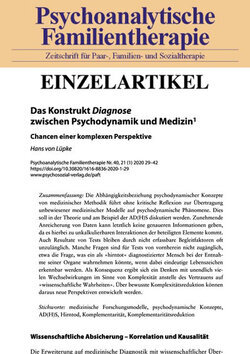14 Seiten, PDF-E-Book
Erschienen: Juni 2020
Bestell-Nr.: 29165
https://doi.org/10.30820/1616-8836-2020-1-29
abonnieren
Hans von Lüpke
Das Konstrukt Diagnose zwischen Psychodynamik und Medizin (PDF)
Chancen einer komplexen Perspektive
Sofortdownload
Dies ist ein E-Book. Unsere E-Books sind mit einem personalisierten Wasserzeichen versehen,
jedoch frei von weiteren technischen Schutzmaßnahmen (»DRM«).
Erfahren Sie hier mehr zu den Datei-Formaten.
Die Abhängigkeitsbeziehung psychodynamischer Konzepte von medizinischer Methodik führt ohne kritische Reflexion zur Übertragung unbewiesener medizinischer Modelle auf psychodynamische Phänomene. Dies soll in der Theorie und am Beispiel der AD(H)S diskutiert werden. Zunehmende Anreicherung von Daten kann letztlich keine genaueren Informationen geben, da es hierbei zu unkalkulierbaren Interaktionen der beteiligten Elemente kommt. Auch Resultate von Tests bleiben durch nicht erfassbare Begleitfaktoren oft unzulänglich. Manche Fragen sind für Tests von vornherein nicht zugänglich, etwa die Frage, was ein als »hirntot« diagnostizierter Mensch bei der Entnahme seiner Organe wahrnehmen könnte, wenn dabei eindeutige Lebenszeichen erkennbar werden. Als Konsequenz ergibt sich ein Denken mit unendlich vielen Wechselwirkungen im Sinne von Komplexität anstelle des Vertrauens auf »wissenschaftliche Wahrheiten«. Über bewusste Komplexitätsreduktion können daraus neue Perspektiven entwickelt werden.
Abstract:
The dependency of psychodynamic concepts on results of medical research as taken for scientifically proven will be discussed. Deficits in critical methodologi--shy--cal reflexion often lead to a transmission of hypothetical medical concepts on the diagnosis for psychodynamic phenomena. The results are mutual deficits in both medical and psychodynamic research and practice by an increasing dependency on social and economical influences only. This will be demonstrated with the example of AD(H)S. An increasing number of data alone fails to give more exact information due to more incalculable interactions of the elements, known as complexity even in quantum physics. Often results of tests are insufficient or not available, as for the impact of organ transplantation to other persons after »brain death« in spite of obvious signs of living. As a consequence there is no need for new classifications but for thinking in the scope of complexity. The fixation on »scientific truth« should be replaced by the orientation on assumptions that hypothetically reduce complexity in order to find new solutions.
Abstract:
The dependency of psychodynamic concepts on results of medical research as taken for scientifically proven will be discussed. Deficits in critical methodologi--shy--cal reflexion often lead to a transmission of hypothetical medical concepts on the diagnosis for psychodynamic phenomena. The results are mutual deficits in both medical and psychodynamic research and practice by an increasing dependency on social and economical influences only. This will be demonstrated with the example of AD(H)S. An increasing number of data alone fails to give more exact information due to more incalculable interactions of the elements, known as complexity even in quantum physics. Often results of tests are insufficient or not available, as for the impact of organ transplantation to other persons after »brain death« in spite of obvious signs of living. As a consequence there is no need for new classifications but for thinking in the scope of complexity. The fixation on »scientific truth« should be replaced by the orientation on assumptions that hypothetically reduce complexity in order to find new solutions.
Joseph KleinschnittgerS. 5–28Die psychoanalytisch-beziehungsdynamische Perspektive in der Gemeindepsychiatrie (PDF)
Familienähnliche Muster in und zwischen beteiligten InstitutionenHans von LüpkeS. 29–42Das Konstrukt Diagnose zwischen Psychodynamik und Medizin (PDF)
Chancen einer komplexen PerspektiveAstrid KunzeS. 43–53Der Begriff der Anerkennung in den Frühen Hilfen (PDF)
Grit Jahn-JokschiesS. 55–75Zu einer Familie werden im Angesicht von Trennungs- und Verlusterfahrungen (PDF)
Eine FallstudieAngelika SchaakS. 77–95Falldarstellung »Gehen lernen« (PDF)
Peter DottS. 97–116Angst und Regression in der Zeit des Coronavirus (PDF)
Familienähnliche Muster in und zwischen beteiligten InstitutionenHans von LüpkeS. 29–42Das Konstrukt Diagnose zwischen Psychodynamik und Medizin (PDF)
Chancen einer komplexen PerspektiveAstrid KunzeS. 43–53Der Begriff der Anerkennung in den Frühen Hilfen (PDF)
Grit Jahn-JokschiesS. 55–75Zu einer Familie werden im Angesicht von Trennungs- und Verlusterfahrungen (PDF)
Eine FallstudieAngelika SchaakS. 77–95Falldarstellung »Gehen lernen« (PDF)
Peter DottS. 97–116Angst und Regression in der Zeit des Coronavirus (PDF)

